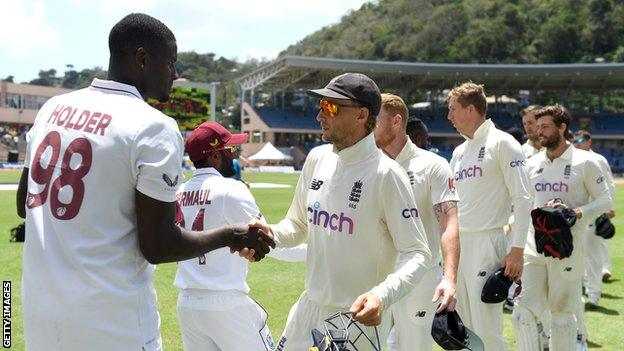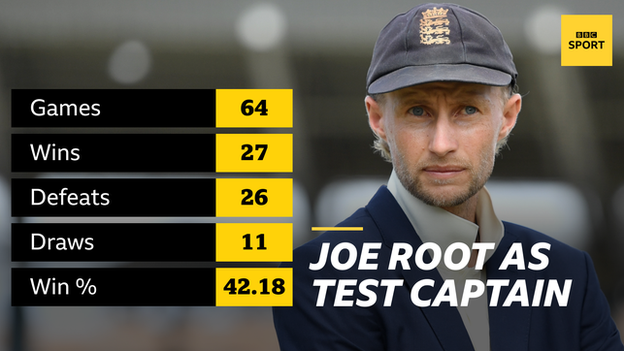England in West Indies: Tourists' series defeat feels like the end of an era - Jonathan Agnew
- Published

England are now winless in nine Tests and have only won one of their last 17
England's 10-wicket defeat by West Indies was a thoroughly deflating experience for anyone interested in English cricket.
England have billed this as a new era, talked about a better atmosphere, but in the end it was same old, same old.
They were hammered in three and a half days, with another chaotic batting collapse thrown in for good measure. From that perspective, nothing has changed.
It leaves the team in a very fragile position.
There is no managing director and no head coach, only a beleaguered captain hanging on by his fingernails.
You could not help but feel a sense of an end of an era in Grenada - but Joe Root will not resign.
He has said as much and still has that sparkle when you look in his eyes - he wants to do his best for the team.
However, there comes a point when you have to stop and ask whether him continuing is in the team's best interests.
These things do come to an end. Like in football, teams tune out from what they are hearing from a manager. Have this team tuned out from Joe Root as captain?
Only they will know, but it would not surprise me if, when the new coach and managing director is in place, they decide to move on with a new captain.
One thing is for certain, after a run of one win in 17 Tests, after the Ashes defeat and now this loss, Root's future as captain is out of his hands.
A colleague in the press box said to me that this defeat reminded them of the Oval Test of 1999 against New Zealand, when Nasser Hussain's England team were booed by their own fans.
On that occasion captain Hussain and coach Duncan Fletcher came together and took the team forward.
It does feel like that again because there are so many holes in the whole structure of English cricket, and on the field England have a 'rabbit in the headlights' mentality they cannot get rid of.
We saw it during the Ashes and it has reared its ugly head again, on day three when England collapsed to 101-8 in their second innings after the West Indies lower-order batted with relative ease earlier in the day.
It was not the easiest pitch to bat on - there was some uneven bounce - but when the pressure is applied to this England batting line-up they fall apart.
They had batted well in the first two Tests, albeit on flat pitches. What is disappointing is the confidence England's batsmen should have gained from that did not materialise in the third Test.
We saw poor batting and moments of madness, like Zak Crawley getting out on the drive again, or Ben Foakes' run-out.
These things happen to teams when they lose that habit of winning matches.
The very best sides, like the West Indies or Australia teams of old, know when the going gets tough they will get over the line. When you get to that point you're halfway there.
England, on the other hand, have lost that completely. When you are not in the best place mentally you do not make clear decisions, as we saw with Dan Lawrence leaving the ball and getting bowled.
When England's batting is put under pressure the wheels fall off.
The inability to get over the line is also why the decision to leave out James Anderson and Stuart Broad for this series has to be viewed as a mistake.
England are not going to turn this around until they start getting wins under their belt so you cannot go away from home, to the Caribbean where they have only won once since 1968, without your two best bowlers.
England cannot go into the first Test of the summer without those two. They may have moved on, but not that much.
That said, even after this series there are some positives.

In his first Test series, Alex Lees showed he has a technique for opening the batting. He may have only scored 126 runs at an average of 21 but he has a solid technique. After some of the quirky set-ups we have seen in England colours in the past few years, that is a start.
Lawrence, even with that poor final dismissal, showed a good attitude and attacking flair with the bat.
Despite the talk about the captaincy, Root is still knocking out hundreds, Ben Stokes looked back to his best in his fine second-Test century, Saqib Mahmood looks the part with the ball and Matthew Fisher seems a decent bowling prospect.
After the Ashes I gave my blueprint about how the England and Wales Cricket Board should move forward - reducing the number of counties to raise the standard of domestic red-ball cricket.
Even if that is not the outcome, I was encouraged by Sir Andrew Strauss announcing a review into the structure of English cricket. That is vital and hopefully there will be a much better pathway for England's men's Test cricketers as a consequence.
At the moment there is a crisis of confidence among the team and a vacuum at the top of the game.
The ECB has to get its act together, make good decisions and get the right people in place so English cricket can rebuild for the future.
Jonathan Agnew was speaking to BBC Sport's Matthew Henry.
